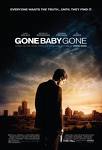I was surprised to learn that Dennis Lehane is a Dorchester native because the dialogue in the film adaptations of his books reads like it was written by a non-local enamored with Boston stereotypes. As in Mystic River, Gone Baby Gone made me wince and cringe as the actors “wikkid pissa’d” their way through a klutzy third-grade-level script. Hollywood needs to take a lesson fron George Clooney in The Perfect Storm and realize that a bad accent causes more distractive harm than good and stresses out the audience.
But what’s most shocking about this film is that, in his directorial debut, Ben Affleck directs circles around Martin Scorsese’s ridiculous attempt to make Boston into NYC with The Departed (known in my house as The Retahdid). Affleck is lucky he’s got such an ace in the hole with his charming, accessible brother Casey, who carries the film gracefully over troubled waters.
Gone Baby Gone‘s not half bad but it does play into a classic Lehane cliché: an endangered child gives a protagonist license to do whatever s/he wants. It’s boring watching characters go all high and mighty; poor Michelle Monaghan gets stuck with the worst and weepiest role in the pic. But she’s just a symptom of another Lehane cliché: sucky female characters. As in Mystic River, none of the female characters are truly strong, likable, or smart. Amy Ryan rightfully earned herself an Oscar nod with her portrayal of a working-class slag whose daughter goes missing but the film leaves her without an ounce of humanity: It’s a fine line between gritty writing and misogyny.
While this film is a much closer vision of Boston than Scorsese’s, its incredulous portrayal of tough neighborhood bars, drug dealers, and police work might have you on the floor laughing. Missing kid causes characters to re-exmaine their moral fiber: It ain’t Shakepeare but at least it ain’t Scorsese.
Grade: C+










You must be logged in to post a comment.